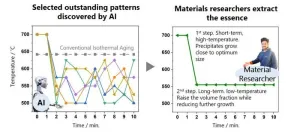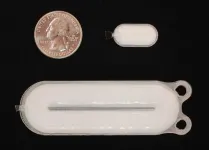(Press-News.org) A cell nucleus is a busy place. Cellular proteins twist and pull DNA, folding the genome into intricate 3D structures that support functioning of its coding parts.
This choreography is essential for cell development, and the exact steps vary wildly between cell types. Establishing proper communication between genes and far-away control switches at the right time in the right cell is not a small feat. In fact, very few proteins have the right combination of features to organize the genome into the right structures.
In a new Cell study, scientists at La Jolla Institute for Immunology (LJI) and Massachusetts General Hospital, Harvard Medical School, show how a protein called IKAROS helps "weave" the genome into the correct structure required for B cell differentiation and generation of a life-saving repertoire of antibodies.
"Without IKAROS, you cannot make a functioning B cell," says LJI Associate Professor Ferhat Ay, Ph.D., who co-led the new study, published recently in Cell.
Ay is an expert in genomic architecture. He investigates where genes are located—and how certain parts of the genome interact. His lab develops bioinformatics tools to create 3D maps of the genome, which is a key step in understanding the genetic underpinnings of immune cell development.
For the new research, Ay's laboratory partnered with Katia Georgopoulos, Ph.D., of Massachusetts General Hospital, Harvard Medical School, who pioneered previous studies showing that IKAROS is critical for immune cell development. “IKAROS acts at the root of this development and enables differentiation of the hematopoietic stem cell into a diverse set of immune cells including B cells,” says Georgopoulos. These earlier studies showed that IKAROS-loss-of function mutations caused lymphoid malignancies in animal models and were associated with poor prognosis in children and young adults with B cell precursor leukemias.
Could IKAROS serve as an early critical organizer of 3D genome organization needed for proper B cell development?
The Ay and Georgopoulos Labs joined forces to test this hypothesis by harnessing IKAROS mouse genetic models, B cell differentiation approaches, bioinformatics tools and 3D genomic maps to answer big questions about immune cell development.
Yeguang Hu, Ph.D., an instructor in the Georgopoulos Lab, performed technically demanding experiments to identify which parts of the genome touch each other with and without IKAROS at work. Daniela Salgado-Figueroa, a UC San Diego Bioinformatics PhD student in the Ay Lab, led the analysis of the terabytes of complex data sets that were generated.
The researchers found that IKAROS solves a big problem in B cell development. B cells use receptors with two "arms" to detect pathogens. These arms have a "light chain" region and a "heavy chain" region. When a B cell recognizes a pathogen, it churns out antibodies with matching arms.
B cells assemble heavy chain regions fairly early in development. The Ay and Georgopoulos Labs found that assembling the light chain regions can be tricky because the genes encoding light chain development sit pretty far apart on the DNA. "This whole region needs to be rearranged in a proper 3D conformation," says Ay. "Something needs to bring them together."
Fortunately, IKAROS is on the scene to help with some genome gymnastics. The two labs found that IKAROS binds to specific parts of the genome and controls the formation of very useful loops using these sites as anchors. This looping brings far-away genes together with their control elements, leading to the activation and expression of the genes needed for proper B cell development and light chain rearrangement. Just as important, this folding of the genome keeps other control elements away from genes that should not be expressed in a B cell.
In a follow-up experiment, the researchers introduced IKAROS into human skin cells. They tested whether IKAROS can organize the genome in a cell type that does not produce any IKAROS of its own. And IKAROS prevailed. IKAROS, indeed, changed the 3D organization of a substantial part of the skin cell genome and led to formation of new loops, some of which resembled those from their B cell analysis.
The scientists emphasize that research into how chromatin is organized in the 3D space can help us understand how healthy cells develop—and how an improperly folded genome causes disease such as immunodeficiencies and cancer. Going forward, the researchers are interested in learning more about IKAROS disruption and disease development.
Additional authors of the study, "Lineage-specific 3D genome organization is assembled at multiple scales by IKAROS," included Zhihong Zhang, Margaret Veselits, Sourya Bhattacharyya, Mariko Kashiwagi, Marcus R. Clark, and Bruce A. Morgan.
This research was supported by the National Institutes of Health (grants R01HL140622, R01AR069132, R56AR082402, T32AI007512, R35GM128938, R21AR074748, and R01AI150860).
DOI: https://doi.org/10.1016/j.cell.2023.10.023
###
About La Jolla Institute
The La Jolla Institute for Immunology is dedicated to understanding the intricacies and power of the immune system so that we may apply that knowledge to promote human health and prevent a wide range of diseases. Since its founding in 1988 as an independent, nonprofit research organization, the Institute has made numerous advances leading toward its goal: life without disease. Visit lji.org for more information.
END
No IKAROS, no antibodies
Researchers map the genome to figure out how a protein called IKAROS controls healthy B cell development
2023-11-27
ELSE PRESS RELEASES FROM THIS DATE:
New framework for using AI in health care considers medical knowledge, practices, procedures, values
2023-11-27
Health care organizations are looking to artificial intelligence (AI) tools to improve patient care, but their translation into clinical settings has been inconsistent, in part because evaluating AI in health care remains challenging. In a new article, researchers propose a framework for using AI that includes practical guidance for applying values and that incorporates not just the tool’s properties but the systems surrounding its use.
The article was written by researchers at Carnegie Mellon University, The Hospital for Sick Children, the Dalla Lana School of Public Health, Columbia University, and the University of Toronto. It is published in Patterns.
“Regulatory ...
Increasing high-temperature strength of materials through collaborative efforts of AI and materials researchers
2023-11-27
1. A materials research team consisting of NIMS and Nagoya University has designed a novel two-step thermal aging schedule (i.e., non-isothermal aging or unconventional heat treatment) capable of fabricating nickel-aluminum (Ni-Al) alloys that are stronger at high temperatures than Ni-Al alloys fabricated using conventional thermal aging processes. This was achieved by using artificial intelligence (AI) techniques to identify several dozen different thermal aging schedules potentially effective in increasing alloys’ high-temperature strength. The mechanisms ...
The jigglings and wigglings of atoms reveal key aspects of COVID-19 virulence evolution
2023-11-27
Auburn, AL – Richard Feynman famously stated, “Everything that living things do can be understood in terms of the jigglings and wigglings of atoms.” This week, Nature Nanotechnology features a groundbreaking study that sheds new light on the evolution of the coronavirus and its variants of concern by analyzing the behavior of atoms in the proteins at the interface between the virus and humans. The paper, titled “Single-molecule force stability of the SARS-CoV-2–ACE2 interface in variants-of-concern,” is the result of an international collaborative ...
UCF receives 3 minority serving institution awards to promote collaborations with NASA
2023-11-27
ORLANDO, Nov. 27, 2023 – Three research projects from the University of Central Florida have been selected for NASA Minority University Research and Education Project Partnership Annual Notification (MPLAN) awards. The grants, worth up to $50,000 each, are designed to connect and promote research collaborations between Minority Serving Institutions and NASA Mission Directorates.
A total of 18 projects received Phase I funding across 15 universities. UCF received the most awards, with all three housed within the College of Engineering and Computer Science. Dean Michael Georgiopoulos ...
Stem cell-based treatment controls blood sugar in people with Type 1 diabetes
2023-11-27
An innovative stem cell-based treatment for Type 1 diabetes can meaningfully regulate blood glucose levels and reduce dependence on daily insulin injections, according to new clinical trial results from the University of British Columbia (UBC) and Vancouver Coastal Health (VCH).
“This is a significant step toward a functional cure for Type 1 diabetes,” said Dr. David Thompson, principal investigator at the Vancouver trial site, clinical professor of endocrinology at UBC and director of the Vancouver General Hospital Diabetes Centre. ...
Wave Devouring Propulsion: a revolutionary green technology for maritime sustainability
2023-11-27
A new form of wave devouring propulsion (WDP) could power ships and help to cut greenhouse gas emissions in the maritime industry.
Academics from Cranfield University have worked on the concept of using wave energy for propulsion, and designed an inventive method of achieving greater thrust from the power of the waves by harnessing a vessel’s submerged flapping foils in an innovative way.
Inspiration from whale fins
Taking inspiration from the power of a whale's fins, the team studied the structure and movement of the tail fin to unravel how it effectively uses wave energy for propulsion. Through simulations and experiments, they developed ...
Algorithmic recommendation technology or human curation? Study of online news outlet in Germany suggests both
2023-11-27
Recommender systems are machine learning applications in online platforms that automate tasks historically done by people. In the news industry, recommender algorithms can assume the tasks of editors who select which news stories people see online, with the goal of increasing the number of clicks by users, but few studies have examined how the two compare.
A new study examined how users of an online news outlet in Germany reacted to automated recommendations versus choices made by human editors. On average, the algorithm outperformed the person, but the person did better under certain conditions. The study’s authors suggest a combination of human curation and automated recommender ...
BU study finds breast density discussions with clinicians varied significantly by race/ethnicity and literacy level
2023-11-27
(Boston)—Breast density information aims to increase awareness of breast density and its risks and inform future breast screening decisions. Breast density notifications (BDN) advise women to discuss breast density with their clinicians, but prior research shows less than half of women in the general population have those conversations and little is known about the content of conversations that do occur.
A new study by researchers from Boston University Chobanian & Avedisian School ...
Alien haze, cooked in a lab, clears view to distant water worlds
2023-11-27
Scientists have simulated conditions that allow hazy skies to form in water-rich exoplanets, a crucial step in determining how haziness muddles observations by ground and space telescopes.
The research offers new tools to study the atmospheric chemistry of exoplanets and will help scientists model how water exoplanets form and evolve, findings that could help in the search for life beyond our solar system.
“The big picture is whether there is life outside the solar system, but trying to answer that kind of question requires really detailed modeling of all different types, specifically in planets with lots of water,” said co-author ...
Deoxygenation levels similar to today’s played a major role in marine extinctions during major past climate change event
2023-11-27
Scientists have made a surprising discovery that sheds new light on the role that oceanic deoxygenation (anoxia) played in one of the most devastating extinction events in Earth’s history. Their finding has implications for current day ecosystems – and serves as a warning that marine environments are likely more fragile than apparent.
New research, published today in leading international journal Nature Geosciences, suggests that oceanic anoxia played an important role in ecosystem disruption and extinctions in marine environments during the Triassic–Jurassic mass extinction, ...
LAST 30 PRESS RELEASES:
Molecular glue discovery: large scale instead of lucky strike
Insulin resistance predictor highlights cancer connection
Explaining next-generation solar cells
Slippery ions create a smoother path to blue energy
Magnetic resonance imaging opens the door to better treatments for underdiagnosed atypical Parkinsonisms
National poll finds gaps in community preparedness for teen cardiac emergencies
One strategy to block both drug-resistant bacteria and influenza: new broad-spectrum infection prevention approach validated
Survey: 3 in 4 skip physical therapy homework, stunting progress
College students who spend hours on social media are more likely to be lonely – national US study
Evidence behind intermittent fasting for weight loss fails to match hype
How AI tools like DeepSeek are transforming emotional and mental health care of Chinese youth
Study finds link between sugary drinks and anxiety in young people
Scientists show how to predict world’s deadly scorpion hotspots
ASU researchers to lead AAAS panel on water insecurity in the United States
ASU professor Anne Stone to present at AAAS Conference in Phoenix on ancient origins of modern disease
Proposals for exploring viruses and skin as the next experimental quantum frontiers share US$30,000 science award
ASU researchers showcase scalable tech solutions for older adults living alone with cognitive decline at AAAS 2026
Scientists identify smooth regional trends in fruit fly survival strategies
Antipathy toward snakes? Your parents likely talked you into that at an early age
Sylvester Cancer Tip Sheet for Feb. 2026
Online exposure to medical misinformation concentrated among older adults
Telehealth improves access to genetic services for adult survivors of childhood cancers
Outdated mortality benchmarks risk missing early signs of famine and delay recognizing mass starvation
Newly discovered bacterium converts carbon dioxide into chemicals using electricity
Flipping and reversing mini-proteins could improve disease treatment
Scientists reveal major hidden source of atmospheric nitrogen pollution in fragile lake basin
Biochar emerges as a powerful tool for soil carbon neutrality and climate mitigation
Tiny cell messengers show big promise for safer protein and gene delivery
AMS releases statement regarding the decision to rescind EPA’s 2009 Endangerment Finding
Parents’ alcohol and drug use influences their children’s consumption, research shows
[Press-News.org] No IKAROS, no antibodiesResearchers map the genome to figure out how a protein called IKAROS controls healthy B cell development





